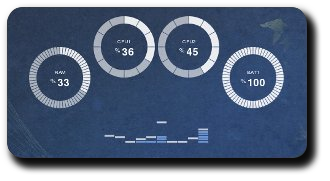The curious case of Screenlets

Apple fans have Dashboard. KDE folks have Plasma. Gnome/Xfce people have, er.. tough choice.
Everyone likes desktop widgets. They’re pretty, and can prove to be really helpful with careful setup. Over the past few years, I have tried a few different widget frameworks and it’s kind of a strange phenomenon that all of them died the slow open-source death. adesklets, gDesklets and now Screenlets have bitten the dust. Screenlets, however, deserves special mention because of being the most recent among the deceased.
People behind Screenlets deserve credit for providing an easy-to-use framework for desktop widgets, which wasn’t the case with adesklets or gDesklets. Nevertheless, the compliment is in a way reserved for the basic framework and not the screenlets themselves. While it was fun and easy to write new widgets in Python, the existing ones were broken more often than not. There must be 100+ screenlets available online right now; pick any recent vanilla distribution and a considerably many will fail to work properly on it. Perhaps this is one of the reasons why the package never made it into Fedora repositories. The base product had significant potential, but the end-results built upon it were — in the greater picture — largely a disappointment. Before the situation improved however, Screenlets passed away quietly. Without even an obituary on Wikipedia or the project page itself. People like me who were waiting for a stable release kept finding out through Launchpad comments that development has split and moved to a new project called Universal Applets.
UA is still in early development stages, and does not offer even all the features present in Screenlets’ last version (such as widget zoom). But at least among all the remaining Gtk+ widget frameworks, it remains the only one with active development going on. While I wish its developers good luck for what appears to be a more promising framework than any of the ones mentioned above, I can only hope that it doesn’t disappear into obscurity like its ancestors — resulting in a Yet-Another-Widget-Framework. Meanwhile, I’m sticking with Screenlets’ last release since it works reasonable well once you’ve sorted individual widgets’ kinks out.
Sometimes, migrating to Qt doesn’t sound all that bad of an idea.
Tags: Desktop, Eye-candy, Gnome, GTK+, KDE, Open Source, Screenlets, Technology, Universal Applets, Widgets, Xfce


